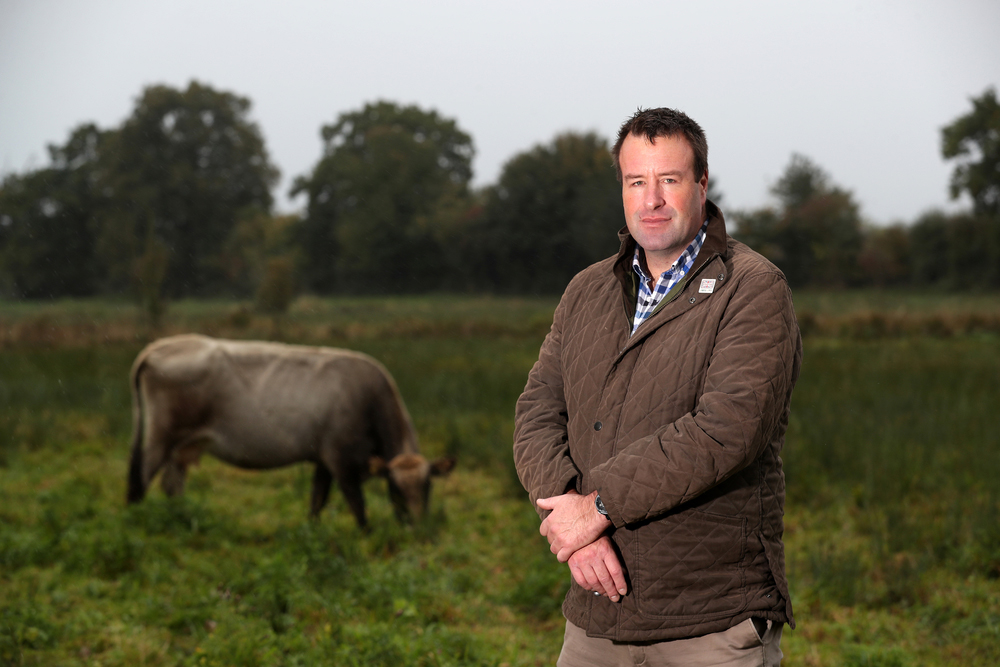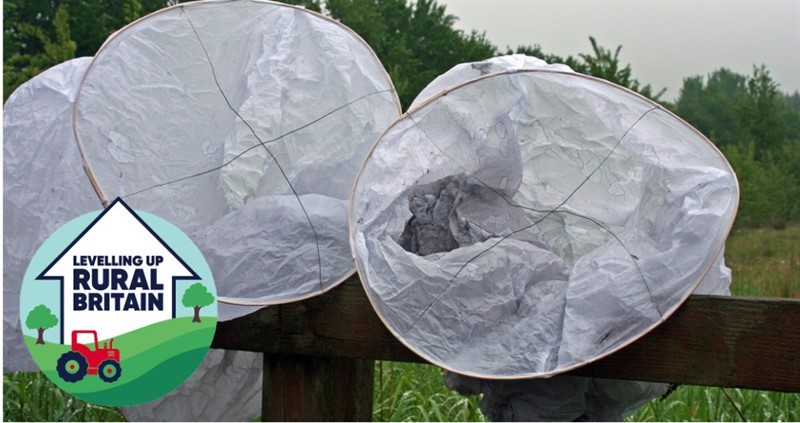The group is calling on the government to act now to make the use of sky lanterns illegal. The letter details how in other countries the release of sky lanterns is considered an environmental crime due to the harm they cause animals, habitats and the countryside.
This work forms part of the NFU's 2021 Levelling up rural Britain agenda, which is helping to create a safer, cleaner, greener rural Britain.
Download the full Levelling up rural Britain report to see how we're working in rural areas to create
jobs, generate green economic growth, tackle rural crime, showcase 'Brand Britain' on the world stage, and improve the health and wellbeing of the entire nation.
By enacting Section 140 of the Environmental Protection Act 1990, the Secretary of State can prohibit or restrict the importation, use, supply or storage of injurious substances or articles, such as sky lanterns. So far, 152 local councils have already banned the release of sky lanterns on council property but with no national legislation in place, the countryside and farms remain unprotected.

NFU Deputy President Stuart Roberts, pictured above, said:
“The global community is already recognising the dangers of sky lanterns. Countries like Australia, Brazil and Germany already have national bans, and we must join them.
“This is a simple but incredibly effective and impactful step the government can take towards a safer, cleaner and greener rural Britain. We wouldn’t light a naked flame in our home and walk away, so why would we send one into the air with no idea whose home or habitat it could eventually destroy?”
Tim Bonner, chief executive of the Countryside Alliance, said:
“Sky lanterns are a blight on the countryside and incredibly dangerous. Once released, there is no way of knowing where they will end up and all too often they end up strewn over fields, causing a major hazard for grazing livestock, not to mention the fire hazard risk they pose. It is high time their use was ended swiftly.”
Paul Hedley, National Fire Chiefs Council (NFCC) wildfire lead, said:
“NFCC fully supports a ban. Sky lanterns have been proven to start wildfires and property fires, kill or injure livestock, as well as polluting our natural environment. They put unnecessary strain on our critical services. Our advice is simple – don’t use them.”
Allison Ogden-Newton, CEO of Keep Britain Tidy, said:
“Although beautiful and often used for sentimental or celebratory purposes, the truth is that what goes up must come down and sky lanterns inevitably become litter. We believe that asking the government to ban sky lanterns will awaken everyone to this fact.”
RSPCA animal welfare expert Dr Mark Kennedy said:
“Though sky lanterns might look pretty in the sky, they pose a serious danger to horses, farm animals and wildlife.
“Sadly, many people are unaware of the potentially deadly consequences the release of sky lanterns can have for animals. Not only are they a serious fire hazard but the RSPCA has had reports of suffering animals through ingestion, entanglement and entrapment, or simply the sight of a lit lantern in the sky causing terrified animals to bolt and harm themselves.
“We know many people are already aware of the dangers sky lanterns pose to animals and we are pleased to work in coalition with the National Farmers' Union and others to raise awareness within the UK government of our concerns.”
Who signed the letter?
- Allison Ogden-Newton OBE, CEO of Keep Britain Tidy
- Amanda Anderson, Director of the Moorland Association
- David Bowles, Head of Campaigns and Public Affairs at the Royal Society for the Prevention of Cruelty to Animals (RSPCA)
- David Brown, Deputy President of the Ulster Farmer’s Union (UFU)
- Des Payne, Safety Team Leader of The British Horse Society (BHS)
- Dr Ed Hayes, Head of Public Affairs, The Kennel Club
- Ellie Brodie, Head of Land Management at The Wildlife Trust
- Eoghan Cameron, Chairman of The British Association for Shooting and Conservation (BASC)
- Gina Bradbury Fox and Julia Bradbury, Managing Directors of The Outdoor Guide
- John Davies, President, NFU Cymru
- Mark Bridgeman, President of the Country Land and Business Association (CLA)
- Mark Coulman, National Chairman of the Tenant Farmers Association
- Mark Hardingham, Chair of the National Fire Chiefs Council (NFCC)
- Martin Kennedy President of the National Farmers’ Union of Scotland (NFUS)
- Paul Branch, Head of Claims of NFU Mutual Insurance UK (NFU Mutual)
- Sandy Luk, Chief Executive Officer of the Marine Conservation Society UK (MCS)
- Stuart Roberts, NFU Deputy President
- Tim Bonner, Chief Executive of the Countryside Alliance
Evidence of the dangers of fire lanterns
- In 2013 Jonny and Tamsin Fuller, who have an arable and livestock farm in Cambridgeshire, lost a cow after it ingested wire from a sky lantern. To see a cow die in a slow painful way was difficult for the farming couple who put a lot of time and effort into rearing their cattle and were now left with a newborn calf that had to be hand reared.
- Also in 2013 a sky lantern set fire to around 100,000 tonnes of plastic recycling at a factory in Smethwick – the largest ever blaze in the West Midlands. Around 200 firefighters attended and 10 were injured
- In April 2016, a fire was started by a sky lantern on a nature reserve in Dorset where it burned and destroyed a total area of 40 acres. It killed a range of wildlife and the habitat they lived in.
- In January 2020, a sky lantern caused a devastating fire at a zoo in Germany killing more than 30 animals. This fire led to the eventual national ban on sky lanterns currently in effect in Germany.
Amanda Anderson, director of the Moorland Association, said:
“The government has identified wildfire as the most serious risk to precious peatland habitat, including blanket bog, which is of international importance. Moorland managers work consistently to reduce the risk of wildfires, which have become increasingly common in recent years, often causing devastation across vast areas. Banning sky lanterns represents a positive step in helping to prevent wildfires and protect moorland habitats.”
Des Payne, safety team lead at The British Horse Society, said:
“Sky lanterns can cause significant trauma and distress to horses and livestock. We strongly urge people not to use them. The pretty sight of a lantern in the sky is not worth the suffering animals can experience. As prey animals, horses can be terrified by sky lanterns looming above them and if one lands in their field, the wire can cause serious internal and external injuries. We have received more than 20 reports of harm caused by these lanterns – with horses dying or having to be euthanised in the worst cases. But this may be the tip of the iceberg as we know only one in 10 people report these incidents to us. The BHS encourages horse owners and farmers to be vigilant in checking their fields and hedgerows and report any incidents involving sky lanterns through our Horse i app or at www.horseincidents.org.uk.”
Mark Bridgeman, CLA President, said:
“Put simply, there is no responsible way to use sky lanterns. Releasing a naked flame into the skies, having absolutely no control where it will fall, can pose a significant risk to livestock, wildlife, the environment, and rural businesses. The CLA has been campaigning for a complete ban for many years. It’s imperative that government listens to the concerns of those living in the countryside and bans sky lanterns once and for all.”
Mark Coulman, national chairman of the Tenant Farmers Association, said:
"We are not out to spoil anyone's fun, but sky lanterns are a major fire risk and a danger to animal welfare. Allowing a naked flame with its own fuel source to be released randomly into the environment and allowing debris from the spent lantern to land anywhere is simply irresponsible."
Paul Branch, head of claims at leading rural insurer NFU Mutual, said:
“NFU Mutual is pleased to support this call for a ban as sky lanterns present a significant fire risk in both rural and urban areas. Sky lanterns can start grassland and moorland fires as well as putting homes, farms and commercial premises at risk. Debris from burnt out lanterns can also injure and even kill grazing farm animals if they eat it.”
